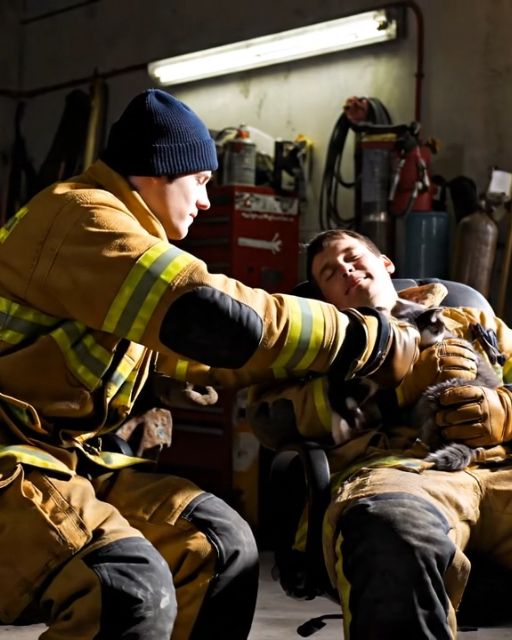The call came in: a structure fire at 5th and Madison. An empty house, maybe squatters inside. We suited up fast, like always—focused, no second-guessing.
We swept the ground floor, just to be safe. Then I heard it—a faint, frantic mewing, barely cutting through the crackling flames.
“Over here!” I yelled, turning toward a fallen bookcase in the corner.
Beneath it, trembling in a broken laundry basket, were two kittens. One black, the other white with patchy fur. Covered in soot. Terrified.
We didn’t hesitate.
I wrapped them in my fire hood and tucked them inside my coat, feeling their tiny hearts racing against my chest all the way out.
Back at the station, we gave them water and gently cleaned them with damp towels. We planned to take them to a shelter after our shift.
But something unexpected happened.
They wouldn’t leave us alone.
They curled up on our laps, followed us around, meowed when we walked too far. It was like they chose us—not the other way around.
We joked about starting a firehouse cat crew, nicknaming them Smokey and Ash. But deep down, we all felt something special.
Later that week, a homeless man named Ray—weathered, early sixties, worn eyes—showed up outside the station.
“I heard about that fire on Madison,” he said quietly. “I used to crash there. Left two kittens behind.”
Smokey and Ash were basking in the sun near the garage. When Ray saw them, his face changed.
“That’s them,” he said, voice breaking. “That’s Maggie’s babies.”
We exchanged looks.
“Maggie?” I asked.
“She was their mom. Sweet calico. She died in the fire, didn’t she?”
We hadn’t known about Maggie before. Suddenly, the kittens’ clinginess made sense—they’d lost more than we knew.
Ray sat on the curb. Smokey and Ash climbed into his lap like they belonged.
“They remember you,” I said.
He nodded slowly. “They kept me warm all winter.”
That night, we pooled our money to get Ray a hotel room and some food. Nothing fancy, but the right thing to do.
Over the next days, Ray visited often—sometimes just to see the kittens, sometimes to talk. He told us stories about his past: once a welder, helped rebuild a bridge in Kentucky.
The station felt alive again.
We talked—half-serious—about turning the storage room into a little living space. Ray needed a place. The kittens wanted him. We missed him when he wasn’t around.
So we did it.
Moved boxes, added a cot, blankets, a heater. The chief wasn’t thrilled but let it be—“As long as he’s sober and helpful,” he muttered.
Ray was more than helpful. He cleaned, cooked, cared for the cats like family.
Then, three weeks later, something strange happened.
One morning, Smokey started pawing at the lockers, meowing like crazy. Ash joined, scratching the door.
We rushed in. Ray struggled to sit up, clutching his chest.
“Feels… tight,” he whispered.
I called the medics.
It was a mild heart attack. The doctor said if we’d found him twenty minutes later, it might’ve been fatal.
“They saved him,” I told the doc. The cats alerted us.
Ray stayed five days in the hospital. Smokey and Ash barely ate, waiting by the door.
When he returned, they greeted him with loud chirps like a reunion.
After that, things changed.
The neighborhood noticed us more—people dropped blankets, cat food, books for Ray. A kid made a “Firefighter Cat Crew” badge and taped it to the wall.
One rainy evening, a woman pulled up in a small car. Curly hair, broken umbrella.
She asked for Ray.
When he saw her, he froze.
“Diane?” he said.
She nodded, tears in her eyes.
She was his daughter. They hadn’t spoken in over ten years.
A mutual friend had seen the photo of Ray with the kittens online—one of the firefighters posted it with a joke. She recognized him instantly.
They sat for an hour outside. Quietly holding hands.
He showed her Smokey and Ash. She knelt, petting them, smiling.
That night, Ray said something I’ll never forget:
“I thought I was forgotten. Useless. Just another shadow. But these kittens—they saw something in me. And somehow, that made others see me again.”
